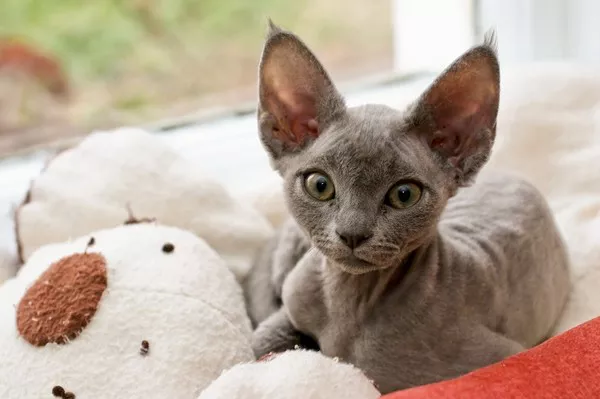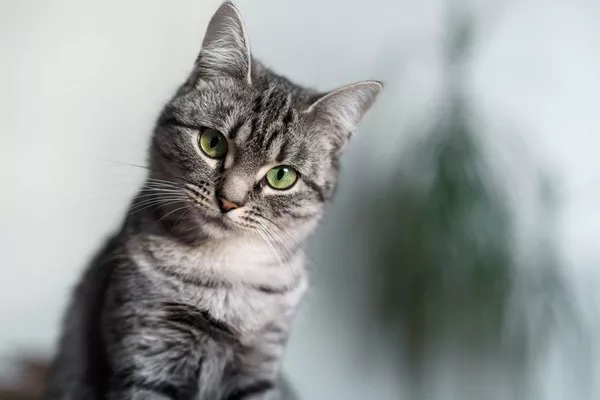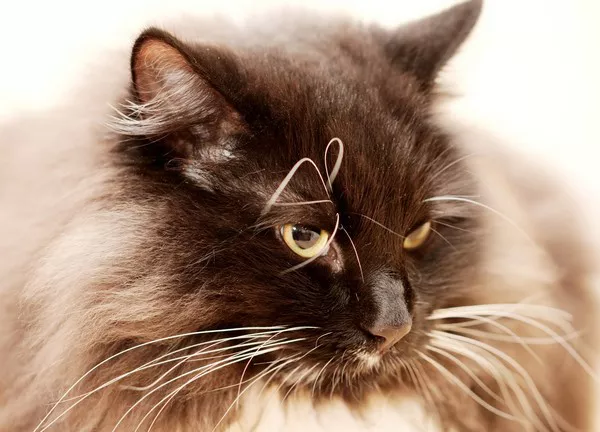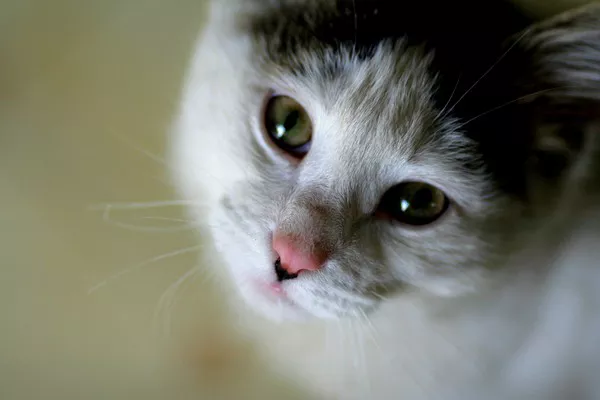Devon Rex cats are an adorable, quirky breed known for their distinctive appearance and playful personalities. As a pet owner, ensuring that your Devon Rex is fed the right amount of food to maintain optimal health is essential. This requires an understanding of the breed’s nutritional needs, portion sizes, meal frequency, and the best types of food to offer. The goal is to keep your Devon Rex at a healthy weight, support their active lifestyle, and provide the necessary nutrients for their overall well-being.
In this article, we will dive deep into the feeding guidelines for a Devon Rex cat, discuss how much they should eat, and offer helpful tips to maintain a balanced diet that supports their health and happiness. We will also address special considerations such as weight management, the importance of hydration, and common mistakes to avoid when feeding your cat.
Overview of Devon Rex Cats
The Devon Rex is a relatively young and distinctive breed known for its unique physical characteristics. With a soft, curly coat, large ears, and large expressive eyes, these cats are often described as “alien-like.” However, it is their playful, mischievous, and affectionate personalities that truly make them stand out among other breeds. Devon Rex cats are highly social and enjoy interacting with their human companions. They are known for their high energy and love of play, which means they need the right nutrition to fuel their active lifestyles.
Despite their petite size, Devon Rex cats have a muscular build and high metabolism, which influences their feeding needs. They tend to be quite vocal and can form strong bonds with their owners, making them a popular choice for families and individuals seeking a loving and engaging pet.
Personality Traits
Devon Rex cats are known for being affectionate, playful, and energetic. They are often compared to dogs because they are highly interactive and crave attention. These cats love to be involved in family activities and enjoy a good play session. Because of their curious and active nature, they may burn more energy than more sedentary cat breeds. As a result, their feeding needs may differ from those of other breeds.
In addition to their playful nature, Devon Rex cats are also known for their intelligence. They can learn tricks quickly, and many owners report that their Devon Rex cats enjoy fetch, playing in water, and even walking on a leash. This active lifestyle necessitates the need for a balanced and nutritious diet to ensure they stay healthy and energized.
How Much Should You Feed a Devon Rex Cat?
When it comes to cat feeding, understanding the specific needs of your Devon Rex cat is crucial to providing them with a balanced and healthy diet. Here, we will explore some general recommendations on portion sizes, meal frequency, and the types of food that are best suited to this breed.
Portion Size
The amount of food you should feed your Devon Rex cat depends on several factors, including their age, weight, and activity level. Unlike many other breeds, Devon Rex cats typically have a higher metabolism, which means they may require more food per pound of body weight to maintain their energy levels.
Kittens (up to 1 year old): Kittens are growing rapidly, so they need more calories per day to support their development. A general recommendation is to feed your Devon Rex kitten 3-4 meals per day, with portions that are slightly larger than adult portions. Kittens can be fed a mixture of high-quality wet and dry food to provide balanced nutrition.
Adult Cats (1 to 10 years old): Adult Devon Rex cats typically require 1 to 1.5 cups of dry food per day, or about 1/2 to 3/4 of a can of high-quality wet food. The exact portion size will depend on the cat’s weight, activity level, and individual metabolism. For a more active Devon Rex, you may need to increase the portion size slightly.
Senior Cats (10 years and older): As Devon Rex cats age, their metabolism may slow down, and their dietary needs might change. Senior cats should be fed smaller, more frequent meals to help with digestion. They may need fewer calories than younger adults, so portions should be adjusted accordingly. It’s also important to monitor their weight to ensure they are not becoming overweight.
It’s essential to monitor your cat’s body condition and adjust their food intake if needed. A well-fed cat should have a visible waistline and be neither too thin nor overweight. Overweight Devon Rex cats are at a higher risk for developing health issues like arthritis or diabetes, so portion control is essential.
Meal Frequency
Devon Rex cats typically thrive on two meals per day, but this can vary depending on your cat’s age and lifestyle. Kittens, for example, require more frequent meals (up to 4 times per day) due to their high energy and fast metabolism. Adult cats are generally fine with 2 meals per day—one in the morning and one in the evening.
If your cat is particularly active or has a higher metabolism, you may choose to feed them smaller meals more frequently throughout the day. Similarly, if your cat is less active or tends to overeat, dividing their food into smaller portions can help prevent obesity.
Type of Food
The type of food you choose for your Devon Rex cat plays a significant role in their overall health. A balanced diet with the right combination of protein, fats, carbohydrates, vitamins, and minerals is essential for their well-being.
High-Quality Dry Food: High-quality dry cat food is an excellent option for Devon Rex cats because it is easy to store, convenient to serve, and often helps with dental health. Choose dry food that is rich in animal-based protein (such as chicken, turkey, or fish) and contains high-quality fats to support your cat’s energy levels and coat health. Avoid foods with excessive fillers like corn or soy, which offer little nutritional value.
Wet Food: Wet food is an excellent option for cats that need to increase their hydration or have specific dental concerns. It also provides a great source of animal-based protein and is often more palatable for picky eaters. Many Devon Rex cats enjoy the moisture and texture of wet food, which can also aid in weight management by offering more filling meals with fewer calories. Look for high-quality, grain-free options that feature real meat as the first ingredient.
Raw and Freeze-Dried Food: Some cat owners choose to feed their Devon Rex cats raw or freeze-dried food, believing it to be more natural and nutrient-dense. While these can be good options, it’s important to do so under the guidance of your veterinarian to ensure that all nutritional needs are being met.
Special Considerations
While feeding your Devon Rex cat, there are several factors you need to be aware of to ensure they maintain a healthy weight and diet. Below are some important considerations:
Weight Management
Devon Rex cats are known to have a hearty appetite, and they can be prone to obesity if overfed or if their food intake is not properly managed. Obesity can lead to serious health problems, including joint issues, diabetes, and heart disease.
Monitor Caloric Intake: Measure your cat’s food to ensure they are getting the right portion sizes based on their activity level and weight.
Frequent Weigh-Ins: Weigh your cat regularly to track their weight and body condition. If you notice any significant weight gain, adjust their food intake and increase their exercise.
Nutritional Needs
A balanced diet is crucial for Devon Rex cats. This breed requires high-quality protein to support their muscular build and high metabolism. Additionally, fats are essential for maintaining their skin and coat health, as Devon Rex cats can sometimes be prone to dry skin.
Protein: Look for cat food that lists real meat (chicken, turkey, beef, fish, etc.) as the first ingredient. This provides the essential amino acids needed for muscle development and energy.
Fats: Essential fatty acids, such as Omega-3 and Omega-6, promote healthy skin, a shiny coat, and overall cell function.
Vitamins and Minerals: Ensure your cat’s food contains essential vitamins and minerals, including vitamins A, D, and E, and taurine, an amino acid critical for heart and eye health.
Fresh Water
It’s essential to always provide your Devon Rex with access to fresh, clean water. Cats, particularly those on dry food diets, can be prone to urinary tract issues and dehydration. To encourage hydration, consider adding wet food to their diet, which contains moisture to help keep them hydrated.
Feeding Tips
Transitioning Foods: When switching to a new type of food, do so gradually over the course of 7-10 days to prevent digestive upset. Start by mixing a small amount of the new food with the current food, gradually increasing the amount of new food while decreasing the old food.
Supplements: Supplements are generally not necessary if you are feeding a high-quality, balanced diet. However, if your cat has specific health concerns (e.g., joint problems or skin conditions), consult your veterinarian about adding supplements such as Omega fatty acids, glucosamine, or probiotics to their diet.
Conclusion
Proper cat feeding for your Devon Rex is essential for maintaining their health, energy, and longevity. Understanding your cat’s specific nutritional needs, portion sizes, and meal frequency will help you keep your cat at a healthy weight and ensure they receive the necessary nutrients for an active and happy life. By following these guidelines and monitoring your cat’s health, you’ll be able to provide your Devon Rex with a diet that supports their unique needs and personality.
Related Topics



























